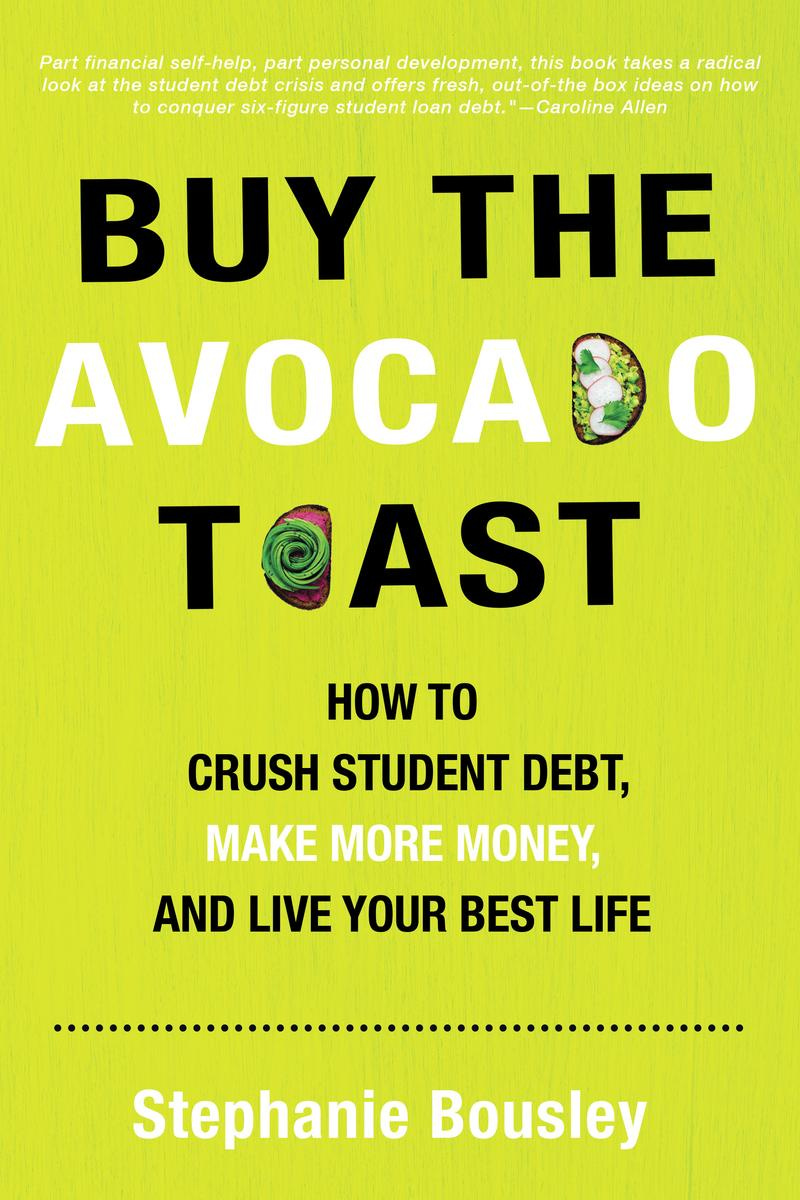Buy the Avocado Toast: The Book that Changed How I Feel About Money
1,000 words on the personal finance book that made me less afraid of money.

In 2020, I made $8 an hour. I wanted to make more money, and I desired some life trinkets that require money—such as a well-decorated home and the ability to travel. But I was unsure how someone such as myself—a chronically fatigued recovering slacker—could earn more money.
On a trip to Barnes and Noble, I encountered a small book with a bright green cover.
I hemmed and hawed about buying it, as always, because I need to curb my impulse buying and I need more books like I need a hole in the head. But snippets from what I read resonated with me, so I decided to buy it.
After reading Buy the Avocado Toast, I realized it was possible to rethink my relationship with money. I had, and still need to work on overindulging with the lattes. But lattes and avo-toast aren’t the problem.
Low self-esteem, thinking I’m not worthy of a higher paying job, and trying to fill an emotional hole with purchases is the problem.
In the introduction, Bousley sounds more relatable and approachable than many others who have written about personal finance:
Let me be clear—I never set out to author personal finance books or become some debt expert. I have a different full-time job. I am just a person who had a particular set of experiences that I wanted to share in order to help other people with student loan debt or fears that they failed in life because of their financial situations.
I appreciate the concrete advice without the moralizing from other finance influencers. I also appreciated the relatability, the imperfection, and the actionable steps laid out to work on myself, so working on finances would be an easier task.
The first chapter starts with an audacious suggestion: Copy how the rich think about themselves. This entails six tendencies she noticed while working for the wealthy:
You are special. This will make people who rant about participation trophies (that my generation didn’t ask for) insane. But the premise is that people with money believe there is something special about them. They won't say it of course, but they think it.
Sometimes the rules don’t apply to you. Related to the first point.
Money opens doors.
Put yourself first. As someone who is nonconfrontational, often to a fault, I relate to Bousley’s fear of asking for more money and never wanting appear entitled. Imagine her surprise when as she was exiting one job, her boss said he was willing to pay her $15,000 than what she had asked for.
Having money isn’t bad. I want a well-decorated home, good food, the ability to host small gatherings, a gym membership, and fun travels. I can’t think of the medium as bad while simultaneously desiring what it can provide for me.
Wealth is a choice. This one I struggle with, based on my politics and worldview.
Selling Yourself Short Isn’t Noble
One major point throughout the entire book is how selling yourself short leads to financial struggles. Having a fragile ego leads to trying to keep up with the Joneses. This will lead to financial struggles.
The lessons toward the end of the book are the most important takeaways. In one of the last chapters, Bousley talked of how she feared making herself vulnerable if she asked how she could improve in any way.
I was afraid of appearing too eager in my goals and dreams, so I downplayed pretty much every area of my, lest actually wanting something or someone exposed me to disappointment and pain.
This sentence punched me in the gut the first time I read it. It’s exactly how I’ve been living my life—afraid of asking for more. Afraid of being too much. Afraid of wanting too much.
Of course, this fear manifested in my finances, or lack thereof.
That said, even though I’m still not rich. I paid off the last bit of my student loans with the birthday money my parents gave me. I have an IRA and a retirement account. I invest a little bit extra with Acorns. I am not intimidated by investing like I used to be, though I have more to learn. I’m even learning about REITS.
And I can shamelessly eat avocado toast for breakfast.
Pivoting to Higher-Paying Occupations
I still haven’t done this—I’ve just started a new position in healthcare administration. But this is the first time I saw how a recovering slacker like myself could build up my skills and see a path toward a higher-paying job. An actual path for someone like me, fighting the impulse to regret my humanities degrees.
The chapter about getting a higher-paying job has many tips that I won’t break down for the sake of space. Sadly, some tips might be outdated in this current job market. However, the ending is the most important point of the chapter:
Take the initiative to search for new opportunities, always remembering to constantly challenge the limits of what you think your skillsets are worth. If someone is willing to pay $80K, someone else will pay $90K. You are your biggest advocate. Keep pushing, and you may find a six-figure career is more of a possibility than you thought.
Everything Else
Other topics Bousley writes about include:
How unpaid internships set people up for being underpaid.
Living abroad to pay less taxes.
How to purchase a home even with debt.
Side hustles worth the time.
Psychological issues that keep you broke.
Buy the Avocado Toast is a quick and inspirational book that moves away from the tut-tutting of popular financial advice. Beyond the money advice, Bousley gives fresh advice on how to change your mindset and outlook on not only your finances, but your life.




